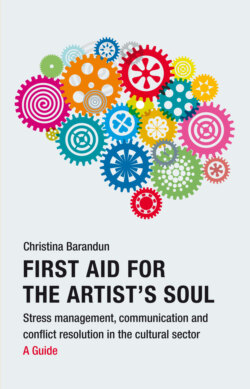Читать книгу First Aid for the Artist's Soul - Christina Barandun - Страница 15
На сайте Литреса книга снята с продажи.
Workplace and work organisation
ОглавлениеLet’s look at the external circumstances in which artists work.
The daily work in an orchestra is a nightmare for the ears. No fewer than 30 per cent of musicians under 35 have impaired hearing.4 Rehearsing for the chorus is likewise a daily challenge. Day after day, 40 to 60 people sit side by side, chair next to chair, and work together for several hours. The narrow shared dressing rooms offer few possibilities for withdrawal during breaks.
The time pressure people work under is unusually high. At major theatres and opera houses there are not only many new stage productions every season, but previous productions are also remounted. Städtische Bühnen Frankfurt, for example, had 34 new productions in the theatre and 13 in the music theatre in the 2013-14 season, with a total of 96 stage productions.5
Generally, each production has a rehearsal time of around six to eight weeks. The complex dovetailing of various technical departments – such as lighting, stage, sound, make-up and costume – must be reconciled with a number of different artistic requirements and areas. There is little time to test, to optimise, to fully develop. Inevitably things are done in a hurry and under pressure. The art of improvisation is in high demand; of course, to some degree, improvisation is inspiring and broadens horizons, especially for artists. But once improvisation has become the norm in response to unworkable organisational structures and weaknesses in internal communications, it becomes exhausting and wears people out. If you are constantly playing catch-up, unable to complete tasks to your own professional standards (if at all), your creativity will be severely undermined, as we will see in the Chapter 4: Methods for Coping with Stress. As well as this, you will be unable to find any deep sense of satisfaction, which is a great source of motivation for an artist – especially when taking into account the lack of other motivating career factors, like reliable career opportunities and solid professional development. Uncertainty due to temporary contracts, poor pay and many hours of overtime also have a debilitating effect, likewise the unsocial working hours: rehearsals in the morning, performances in the evening or on the weekends, in shifts. Family and friends are often neglected; outside hobbies fall by the wayside. A closed-in culture develops that shuts out invigorating stimuli from outside the theatre.
At some theatres, the situation is aggravated by touring, and the poor performance and rehearsal conditions it entails. But the conditions at one’s own theatre – e.g. lack of recreational spaces – can also trigger stress. In some theatres there isn’t even a decent cafeteria, even though the positive impact of having a place to meet – and serves good-quality, healthy meals at convenient times for theatre staff – cannot be overstated.
